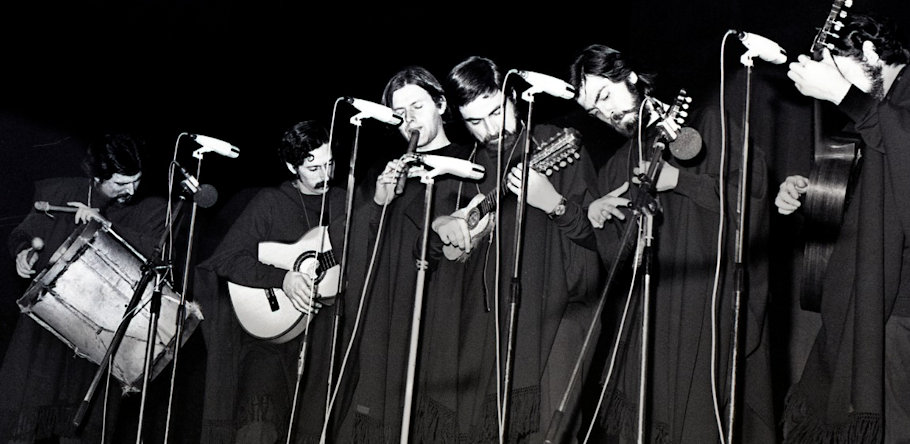Aakuluk: Nunavut’s first record label
Iqaliut, capital of Nunavut, “is a place rich in musical culture and talent, but bereft of music business infrastructure. But now there is a music label, and that’s a start”. So says the website of Aakuluk, the northern territory’s first ever recording company, founded in 2016, and headquartered in this town of 8,000 people. Aakuluk was set up by The Jerry Cans, a five-piece band that fuses throat-singing with contemporary instruments and folk-rock styles. It’s fronted by Nancy Mike (throat-singing, vocals, accordion) and Andrew Morrison (guitar, vocals). The band has released three albums, and toured Canada, the USA, Australia, Germany, and Scotland, singing in the Inuktitut language. Mike says she wants her children to be able to speak, read, and write her native Inuktitut. Morrison, who grew up in Iqaliut and speaks Inuktitut, says The Jerry Cans “are hoping to change the idea of what mainstream media, or mainstream music, should be, by continuing to sing in Inuktitut.” Their music references problems like colonialism, racism, suicide, and high prices. Aakuluk has signed other artists, including throat singer Riit (who combines traditional melodies and throat-singing with pop production) and blues/soul band Josh Q and the Trade-Offs. For more info: www.aakulukmusic.com.
CWU & Culture Matters arts awards
Britain’s Communication Workers Union (CWU), representing 194,000 workers, (including 110,000 postal workers), has teamed up with the left-wing website Culture Matters to launch an annual Songwriting and Spoken Word Awards contest. Each year, judges from the CWU and Culture Matters will select five winners, who will receive £100 cash each, plus an invitation to perform at the CWU’s annual convention. The CWU and Culture Matters are seeking original submissions in the English language by solo or duo artists/performers. “We want to encourage our members in the CWU, and working people everywhere, to express themselves creatively on themes that matter to them as workers,” says CWU General Secretary Dave Ward. This year’s winners will be invited to perform in April at the CWU’s convention in the south-England seaside town of Bournemouth. The contest is restricted, understandably, to U.K. residents. Is it too much to ask a Canadian union to co-sponsor similar awards with a working-class cultural organization – awards which would recognize and encourage performers who create works meaningful to the Canadian working-class? How about CUPW joining with Mayworks? For more info: www.culturematters.org.uk
Indonesian musicians organize union
The International Federation of Musicians (FIM) reports that the founding congress of the Indonesian Musicians Union will take place in Jakarta in April. The Southeast Asian republic is the largest Muslim country in the world, with 261 million people. Indonesia has a rich musical tradition. It’s celebrated for its gamelan orchestras – community-based ensembles that feature elaborate combinations of gongs and other percussion instruments. While ancient traditions endure, contemporary Indonesian music also reflects other influences, such as classical, rock, hip-hop, and jazz. The union drive was initiated a dozen years ago, as Indonesia emerged from decades of repressive military dictatorship. In 2006, local performers began meeting with FIM representatives, and with delegations from the International Labour Organization and the World Intellectual Property Organization. Last November, a three-day conference in Jakarta, attended by many renowned Indonesian artists, set the stage for the founding congress. The IMU promises to be guided by internal democracy, transparency, and gender equality. It will seek fair compensation and benefits for musicians, and will cooperate with other unions at both the national and international levels. Indonesia is governed by the centre-left Indonesian Democratic Party of Struggle. President Joko Widodo is reputedly a big Metallica fan. For more info: www.fim-musicians.org
David Rovics’ musical history project
American folksinger David Rovics has roamed this continent, and much of the world beyond, for more than twenty years, performing his topical and historically-informed songs wherever people are in struggle against the capitalist system. What’s less known about Rovics is his commitment to educating the younger generation. His songs are used as teaching aids in Germany and Sweden. In the USA, they’re used by the Zinn Education Project, which is based upon Howard Zinn’s popular “People’s History of the United States”. David’s project offers two teaching modules. The first covers U.S. and world history. The second covers current events since 2010. Each module presents relevant Rovics songs with introductory text. About 200 songs are used in the course. The Rovics Music History Project is available free of charge, but he asks users to consider joining his CSA (Community Supported Art) sustaining fund. For more information visit www.davidrovics.com where all of Rovics’s songs can be found, as well as tour information, a thought-provoking blog, and the music history project itself. Make a donation and download his latest album, “Ballad of a Wobbly”. It’s one of his best yet. Don’t miss my personal favorite on the new album: “Commandante Fidel Alejandro Castro Ruiz”.




